Road to Hong Kong (1962)
“I bet you never thought you’d have a fortune riding in the old melon.”
|
Synopsis: |
|
Genres, Themes, Actors, and Directors:
Review: … and gamely allow themselves to get into all sorts of foolish situations; meanwhile, the space travel plot is so ridiculous — in true Road to… fashion — that you can’t help watching in anticipation of what bizarre twist will come next (just wait for the banana-feeding machine). Meanwhile, Collins is actually a fine replacement for Lamour, exhibiting natural chemistry with both aging leads, and taking the silly plot just seriously enough. Speaking of Lamour, however, her brief cameo appearance late in the film is unfortunately a bit pathetic. While she had every right — as an essential member of the earlier Road to… trio — to insist on appearing in this film, her over-the-top nightclub performance here (playing herself) simply doesn’t provide her with a dignified exit from the series. Note: Watch for Peter Sellers in an early, uncredited scene as an Indian neurologist attempting to diagnose Hope’s memory loss — he (temporarily) steals the film. Redeeming Qualities and Moments:
Must See? Links: |
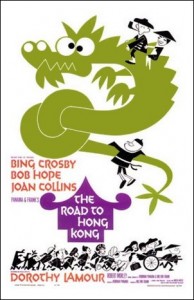
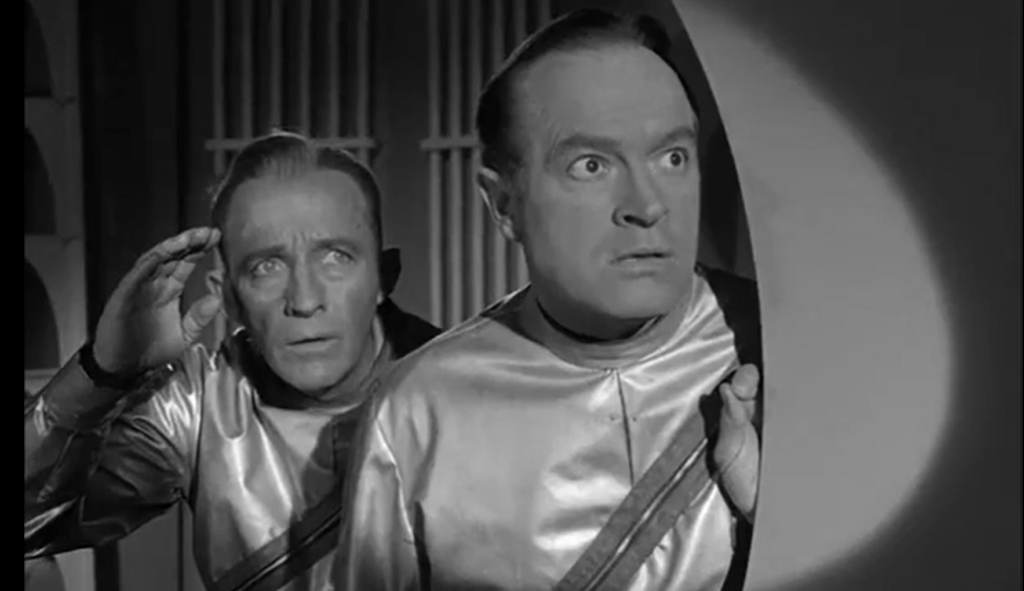
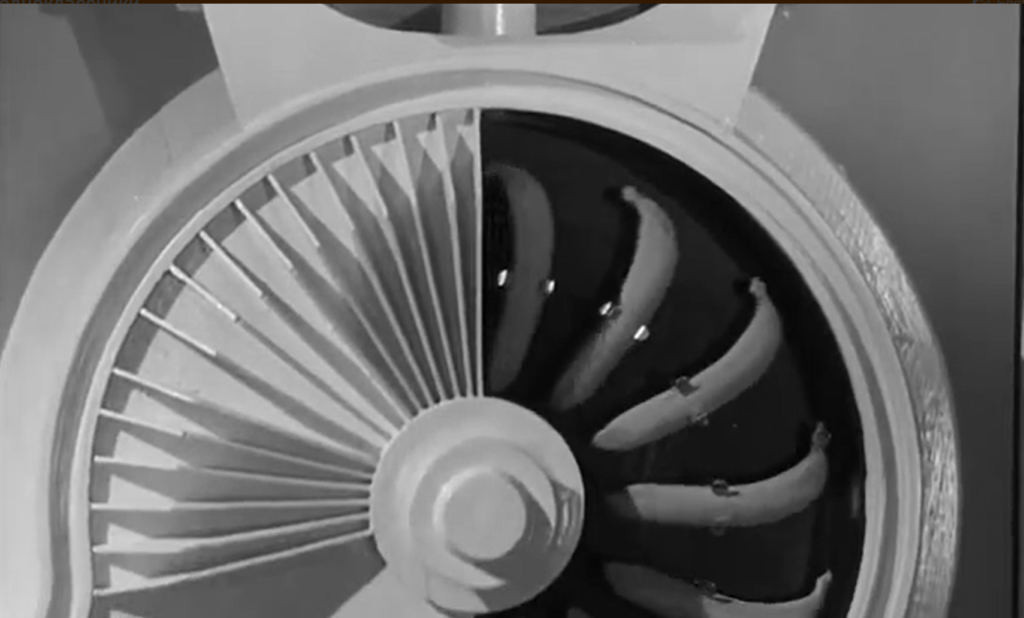
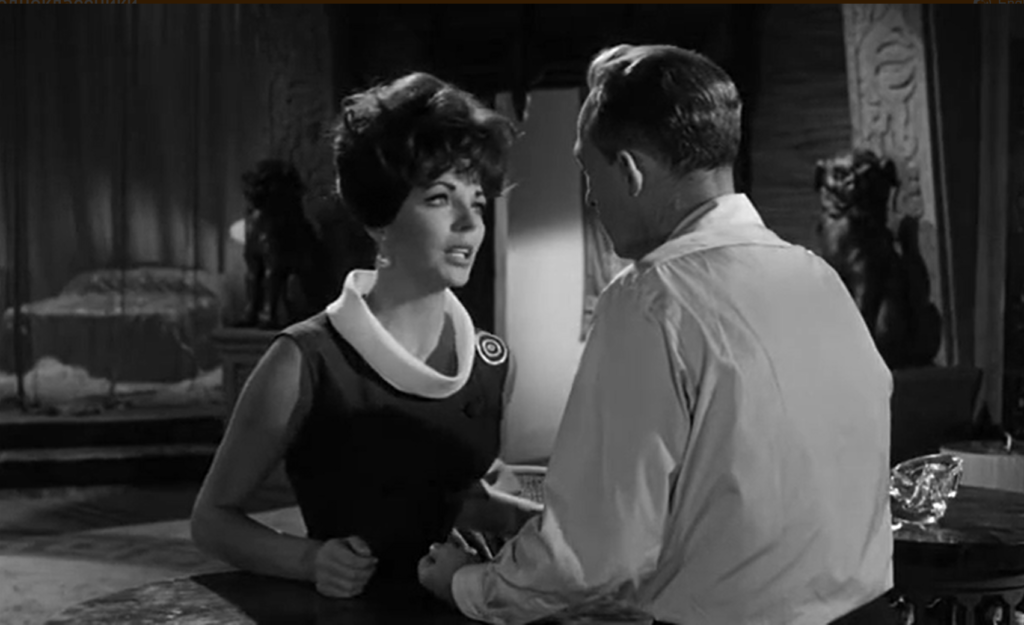
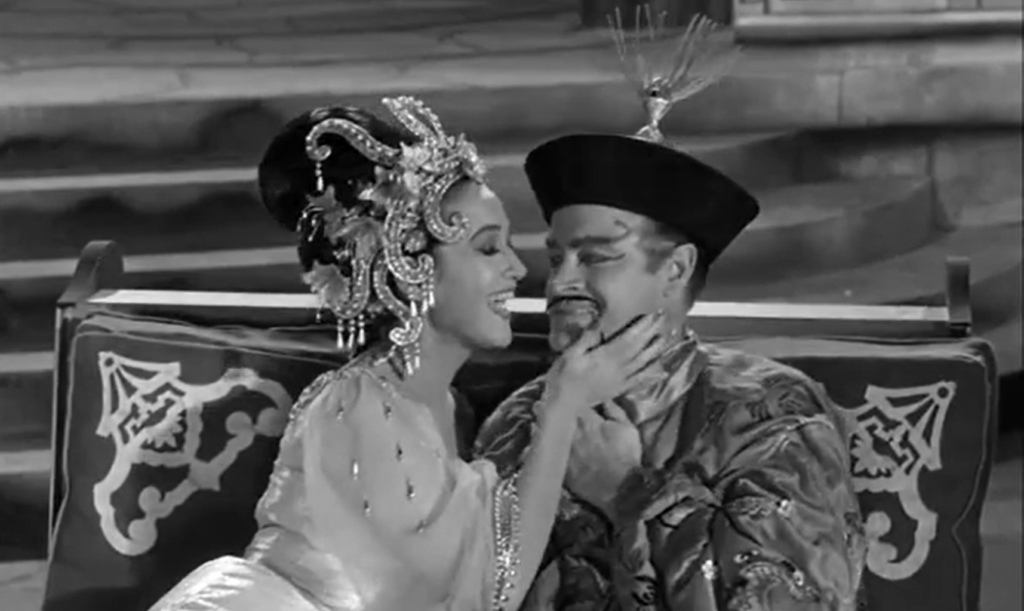
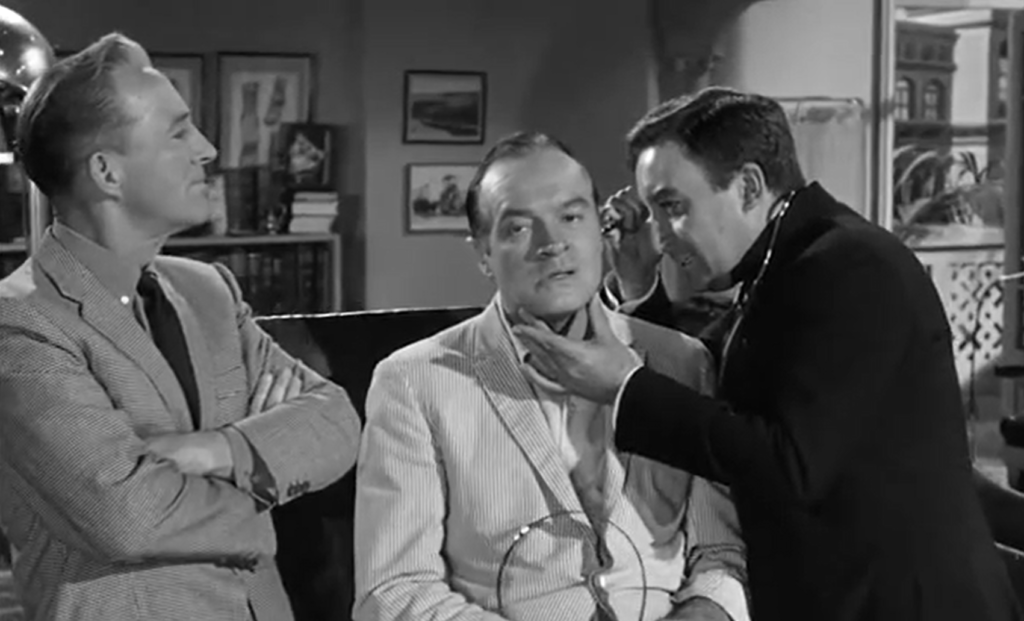
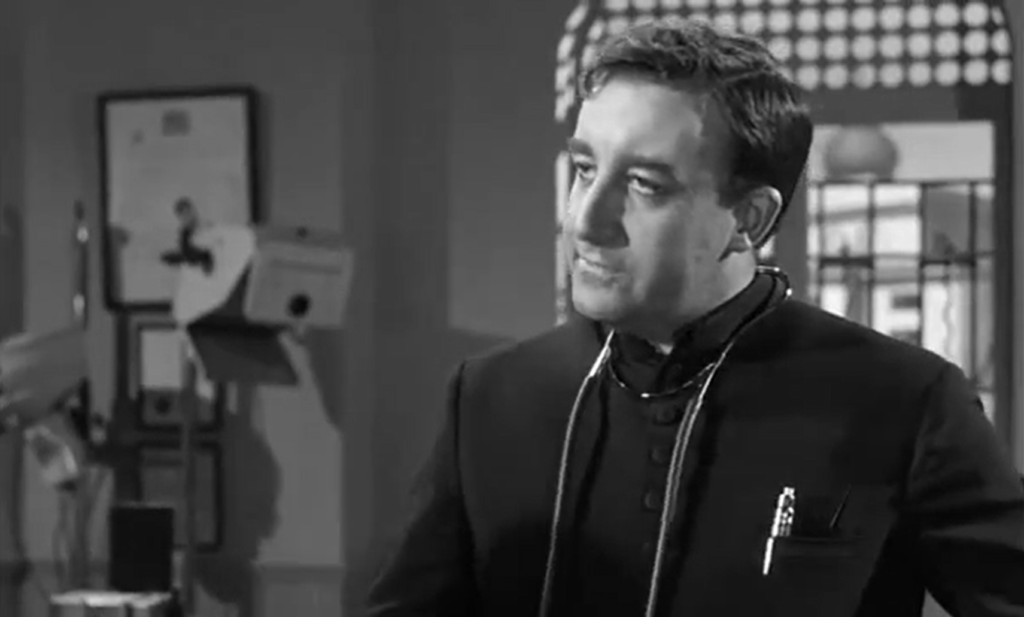
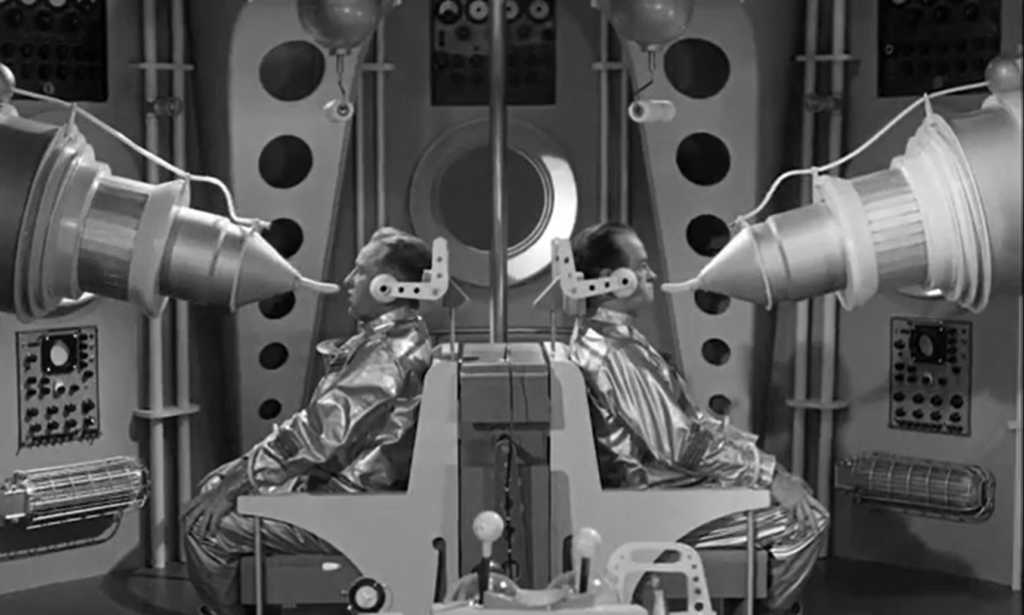
3 thoughts on “Road to Hong Kong (1962)”
Not a must, by any means.
How much you enjoy this will depend on your preference in ‘silly entertainment’. I happen to enjoy silly things on various levels. But I have a very low tolerance for old jokes, esp. the tired, almost meaningless type that lean toward vaudeville – and this movie’s got plenty of ’em. So, for yours truly anyway, this one’s a huge snooze.
Oh, sure, there’s the odd funny bit here and there – way too few. (In fact, Sellers’ cameo is mainly interesting because, in a single scene, it shows that a new kind of comedy was becoming king. Though the Sellers jokes are a bit dated as well, his delivery still holds up somewhat – and he appears to be improvising some; i.e. in finding himself getting turned on by Hope’s blue eyes?! Yowza!)
As for the women, my feeling is opposite that of the assessment. To me, Collins appears to be under-playing – as if she’d been instructed to do so, so as not to be a scene-stealer. Whoever dressed her made sure to downplay there as well – she appears drab. By comparison, Lamour comes off as a very welcome relief once she finally shows up. Aside from the fish appearing from Hope’s clothes everywhere during Lamour’s musical number (which actually *is* a kind of silly I think works well), I do like the moment of panic backstage as Hope quickly explains to Lamour what’s been going on:
Lamour: Is that the plot of the picture so far? I better hide you.
Hope: From the killers?
Lamour: From the critics.
(Indeed.)
Aside from the exception here and there, neither Hope nor Crosby had a particularly distinguished career as film actors. They’re essentially entertainers – and very famous as such. Both were served much better by television.
When I was a kid, the ‘Road’ movies played on tv constantly. It’s been years since I’ve seen the better ones (if there has to be a worst, ‘Hong Kong’ would seem to be it), so I’m somewhat curious as to how I’d react now to those of higher quality.
I doubt, though, that I’d recommend ffs see more than one in the series – and let them be on their own after that. As they say, if you’ve seen one… (and that’s basically the case with this series).
[Cinema history note: the creative team here – Melvin Frank and Norman Pamana – were also very much on board for ‘The Road to Utopia’, as well as the Danny Kaye classics ‘The Court Jester’ and ‘Knock on Wood’.]
It really is interesting how subjective comedy is — more so than any other genre, I think. For instance, the one running gag I DID find tedious in this film was the fish-down-the-back sequence (!).
Our divergent takes on this film simply further my belief that it’s incredibly challenging to designate which comedies are “must see” for film fanatics or not, IF you’re basing your assessment purely on “comedic value” (whatever that even means). I’m more in favor of looking at other qualities — including historical importance, performances, overall script, etc.
Speaking of the script, it’s the verbal interplay between Hope and Crosby that I find most delightful about each of the “Road” films — and that’s what redeems even the clunkiest for me, in some fashion, rather than the (admittedly often tiresome) vaudeville acts.
With all that said, Road to Hong Kong is certainly NOT the film to start off with if you’re new to the series — partly because so much of the enjoyment (again, if you’re going to enjoy them at all — which is subjective) comes from the in-jokes. The entire opening musical sequence in “Hong Kong”, for instance, references every single other “Road” film.
But I still don’t agree that this is the worst of the series. The one title omitted from Peary’s book, Road to Bali, wins that award for me — simply because it really did seem to simply be treading the same old water. Road to Hong Kong, on the other hand, goes in a completely different direction (genre-wise), and — I think — does a fine, irreverent job making fun of sci-fi/space travel while offering fans plenty of predictably snarky and rivalrous Hope/Crosby interplay.
A final note — I would definitely agree that film fanatics need only see one film in the series. I ended up voting for two, simply because I’m a fan and couldn’t make up my mind, but I could easily be persuaded to drop one. I find it revealing, but not surprising, that none of the “Road” films are listed in the book “1,001 Movies You Must See Before You Die”. The “Road” films are not by any means amazing film-making, or even necessarily cult favorites anymore, as Peary labels them in his book — but as an ongoing part of film (and, more specifically, box office) history, I think ff’s would be missing out by not at least trying one out. My last soapbox comment on that front is that one should never put a finite limit (like, say, “1,001”) on how many movies are “must see” — to do so would be to inevitably insist that newer titles must take the place of older ones. As stated in the girl scout chant, “Make new friends, but keep the old — one is silver and the other gold.”
I definitely agree with you re: the difficulty involved when deciding which comedies are must-sees – appreciation of comedy is a very subjective thing.
And so much can be involved inside that subjective process.
In one sense, comedies are no different than any other genre, if they don’t suit a person’s taste. I’m sure there are people who don’t much care for comedies (maybe because they’re very serious-minded people). By the same token, there are people who, no matter what, won’t respond to musicals, westerns, documentaries, foreign films, you name it. Those are subjective decisions as well. [Although, generally speaking, ffs are real across-the-board people.]
What makes comedy different, perhaps, is its very fluid nature. As I implied in my post, styles of comedy evolve. Some people move on from past styles in favor of how comedy is and continues to be stretched (I’m rather like that – although I can give you many examples of old comedy films which I can still heartily embrace; i.e., Buster Keaton will probably always have me in stitches – and ‘Bringing Up Baby’ is still one of my all-time favorite films). Others may, no matter what and for whatever reason, retain a fondness for certain older styles of comedy because they either still find them genuinely funny or the nostalgia they feel for them is very strong.
[This is actually a very large topic and could lend itself well to a panel discussion.]
And there can be even more involved: some may think slapstick, for example, is still a very valid form of comedy (and, for them, it *can* be). Others (again, like myself), have a particular appreciation for the power of words – so the way they are put together for the purpose of comedy is either potent or less so.
Yes, a lot is involved. When it comes to comedy, all we can do is say ‘This is why I think this has value as comedy’ and leave it at that. For example, even though certain classic comedies are, to this day, considered must-sees, I can only agree if I feel the material still holds up well as comedy – since that’s the genre it’s in. In that sense, comedies are much more fragile than other genres as time goes on.
[But, actually, something similar happens with horror films: because of what technology is able to accomplish now, quite a few old horror films – esp. the ones that leave less to the imagination – are now quite silly when we watch them.]
When I see stand-up – like Margaret Cho or Lisa Lampanelli – I am aware that they usually have a crowd of people in front of them who *knew* what they were getting into when they decided to go to that particular comic: for the most part, everybody in the audience has decided that they find this particular person funny.
Film can be different in that many more elements go into a film – and just because you choose to see a comic film star you love, that doesn’t meant you will necessarily love the film.
I’m trying to make an overriding point – but I see I need to just make one: I try, as much as possible, to evaluate comedies as much like any other film as I possibly can. I try to make it simple: does the film work?; and is it powerful enough on its own, for whatever reason, to be considered must-see?
It will still be a decision-making process that will have flaws for some. To a certain degree, as I’ve always said, you ultimately have to go with your gut – and be true to yourself as your film fanatic instincts guide you.